|
|
|
Sort Order |
|
|
|
Items / Page
|
|
|
|
|
|
|
| Srl | Item |
| 1 |
ID:
170477
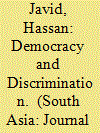

|
|
|
|
|
| Summary/Abstract |
Drawing on fieldwork conducted in Indian and Pakistani Punjab, this paper focuses on how, despite membership in or conversion to majority religious communities, former untouchables in both countries continue to experience caste-based discrimination. In India, a rights-based idiom for caste politics is limited by fragmentation within the Dalit community and the compromises required by electoral politics, while the imposition of a totalising Islamic identity by the state has resulted in the erasure of caste from the political discourse in Pakistan. This paper suggests that class-based mobilisation may be a better route to Dalit empowerment on both sides of the border.
|
|
|
|
|
|
|
|
|
|
|
|
|
|
|
|
| 2 |
ID:
192875
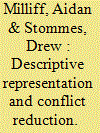

|
|
|
|
|
| Summary/Abstract |
Can greater inclusion in democracy for historically disadvantaged groups reduce rebel violence? Democracy-building is a common tool in counterinsurgencies and post-conflict states, yet existing scholarship has faced obstacles in measuring the independent effect of democratic reforms. We evaluate whether quotas for Scheduled Tribes in local councils reduced rebel violence in Chhattisgarh, an Indian state featuring high-intensity Maoist insurgent activity. These quotas did not originate as a counterinsurgency technique, but instead as an effort to address the longstanding political marginalization of India’s Scheduled Tribes. We employ a geographic regression discontinuity design to study the wartime effects of quotas implemented in Chhattisgarh, finding that reservations reduced Maoist violence in the state. Exploratory analyses of mechanisms suggest that reservations reduced violence by bringing local elected officials closer to state security forces, providing a windfall of valuable information to counterinsurgents. Our study shows that institutional engineering, like reforms to create more inclusive representative democracy, can shape the trajectory of insurgent violence. Institutional engineering creating more inclusive representative democracy during an ongoing conflict can affect the political economy of information sharing in civil war and, ultimately, affect the trajectory of insurgent violence.
|
|
|
|
|
|
|
|
|
|
|
|
|
|
|
|
| 3 |
ID:
118227
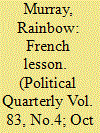

|
|
|
|
|
| Publication |
2012.
|
| Summary/Abstract |
France and the UK both have parliaments with one MP per constituency. This electoral system is known not to be conducive to women's representation, and both countries have struggled with low proportions of women in parliament. France's response was to introduce a gender parity law in 2000. Since then, the number of women in the French parliament has almost doubled, but still remains low by European standards and is far from parity. This article considers what the UK can learn from the French experience. In particular, it considers how gender quotas emerged onto the agenda in France, why they were set at 50% and how effective this was, how they were implemented, and why they have not been more successful. The article does not recommend following in France's footsteps, but the UK can take inspiration from France's successes and seek to avoid repeating her mistakes.
|
|
|
|
|
|
|
|
|
|
|
|
|
|
|
|
| 4 |
ID:
110547
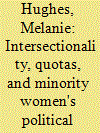

|
|
|
|
|
| Publication |
2011.
|
| Summary/Abstract |
The majority of the world's countries have implemented policies designed to advance the political representation of women and/or minority groups. Yet we do not yet understand how these disparate policies affect the election of minority women. In this article, I draw on theories of intersectionality to conduct the first worldwide analysis of the effects of gender and minority quotas on minority women's representation in national legislatures. Using hierarchical linear modeling, I analyze how quotas influence the election of women from more than 300 racial, ethnic, and religious groups across 81 countries. I find that policies designed to promote the political representation of women and minority groups interact to produce diverse but predictable outcomes for minority women. Although quotas are ostensibly designed to promote diversity and inclusiveness, the quota policies in effect today rarely challenge majority men's dominance of national legislatures.
|
|
|
|
|
|
|
|
|
|
|
|
|
|
|
|
| 5 |
ID:
118228
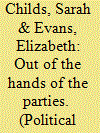

|
|
|
|
|
| Publication |
2012.
|
| Summary/Abstract |
At the next general election the percentage of women elected to the smaller House of Commons risks being lower than in the current parliament, where they constitute 22 percent of all MPs. The 2008-10 Speaker's Conference identified many of the barriers faced by women and other under-represented groups and made a series of recommendations, only some of which have been introduced. The Government favours a voluntary approach to Recommendation 24, which calls for diversity data monitoring, whilst Recommendation 25 which calls for serious consideration of legislative quotas in the absence of a significant increase in the numbers of women in 2010, appears forgotten. A second Speaker's Conference should therefore be established; the issue of women's under-representation should be taken up above the party level-with legislative quotas introduced to address the system level failure of democratic representation at Westminster.
|
|
|
|
|
|
|
|
|
|
|
|
|
|
|
|
| 6 |
ID:
113204


|
|
|
|
|
| Publication |
2012.
|
| Summary/Abstract |
India has had political quotas for Scheduled Castes (SCs) since 1950. Using the 2004 National Election Study, this paper finds that neither SCs nor non-SCs feel that their vote is more/less efficacious living in SC constituencies. Yet, some evidence is found in this study that SCs are approached for their vote more often in SC constituencies. Overall, this suggests that quotas are neither associated with a strong positive reaction among SC voters nor a strong negative reaction among non-SC voters.
|
|
|
|
|
|
|
|
|
|
|
|
|
|
|
|
| 7 |
ID:
192550
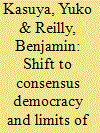

|
|
|
|
|
| Summary/Abstract |
A ‘majoritarian turn’ identified by scholars of Asian democracy in the 1990s saw the rise of mixed-member majoritarian electoral systems and more centripetal party competition across both Northeast and Southeast Asia. In this paper, we argue that since the 2000s, the institutional pendulum has shifted, with more consensual approaches to democracy appearing to better represent key identity cleavages of gender, ethnicity, and territory—a trend evident not just in East Asia but South Asia as well. This new ‘Asian model’ typically involves increasing the proportional components of existing electoral formulas and grafting gender quotas, multiethnic party lists, and quasi-federal elements onto ostensibly majoritarian state structures. We show that these reforms have, as intended, mostly increased female and ethnic minority representation and decentralized governance structures. At the same time, however, these de jure changes are not associated with de facto political development in terms of greater democratic quality, counter to theoretical expectations. Indeed, democracy has declined across most of Asia at the same time as its democratic institutions have become more consensual.
|
|
|
|
|
|
|
|
|
|
|
|
|
|
|
|
| 8 |
ID:
118229
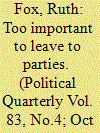

|
|
|
|
|
| Publication |
2012.
|
| Summary/Abstract |
At the current rate of progress it will be another century before parity of representation between men and women is achieved in the House of Commons. This article explores why and how legal guarantees may now be the best available route to secure equality of representation following the repeated failure of the political parties to deliver any significant improvement in numbers through their own preferred, voluntary mechanisms. It explores how the concepts of equality and political representation need to be recalibrated in order to place greater emphasis on democracy rather than meritocracy, and on outcomes as much as opportunities, and offers a broad outline of how a legislative guarantee might be structured and operate in practice.
|
|
|
|
|
|
|
|
|
|
|
|
|
|
|
|
| 9 |
ID:
117806
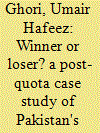

|
|
|
|
|
| Publication |
2012.
|
| Summary/Abstract |
Textiles and Clothing (T&C) is a critically important sector of international trade for developing countries and least developed countries (LDCs). The T&C sector engages abundant labour resources and requires low investment threshold. The T&C sector has been a contentious area in multilateral trade negotiations. With the expiration of quotas in 2005, many T&C dependent countries are experiencing considerable adjustment challenges. Pakistan is one such country that is extensively reliant on T&C industries. This research note presents a brief case study which looks at post-quota developments in Pakistan's T&C trade and the trade and economic policy issues it raises.
|
|
|
|
|
|
|
|
|
|
|
|
|
|
|
|
| 10 |
ID:
172210
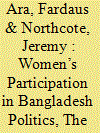

|
|
|
|
|
| Summary/Abstract |
This article presents qualitative data from interviews conducted with female national parliamentarians and local government councillors in Bangladesh regarding barriers to women’s participation in electoral politics. The evidence suggests that a gender wall comprised of institutional, historical, socio-economic and cultural factors continues to prevent Bangladeshi women’s full participation in formal politics at both national and local levels. Since Bangladesh now operates a policy of affirmative action through reserved seats for female politicians, the question arises to what extent this can be seen as a useful longer-term strategy to counteract gender discrimination.
|
|
|
|
|
|
|
|
|
|
|
|
|
|
|
|
|
|
|
|
|